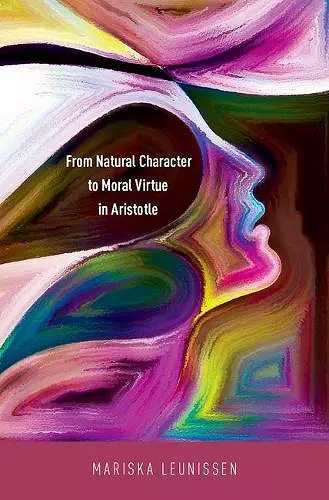From Natural Character to Moral Virtue in Aristotle
Format:Hardback
Publisher:Oxford University Press Inc
Published:7th Sep '17
Currently unavailable, and unfortunately no date known when it will be back

From Natural Character to Moral Virtue in Aristotle discusses Aristotle's biological views about character and the importance of what he calls 'natural character traits' for the development of moral virtue as presented in his ethical treatises. The aim is to provide a new, comprehensive account of the physiological underpinnings of moral development and thereby to show, first, that Aristotle's ethical theories do not exhaust his views about character as has traditionally been assumed, and, second, that his treatment of natural character in the biological treatises provides the conceptual and ideological foundation for his views about habituation as developed in his ethics. Author Mariska Leunissen takes seriously Aristotle's--often ignored--claim that nature is one of the factors through which men become 'good and capable of fine deeds'. Part I ('The Physiology of Natural Character') analyzes, in three chapters, Aristotle's notion of natural character as it is developed in the biological treatises and its role in moral development, especially as it affects women and certain 'barbarians'-groups who are typically left out of accounts of Aristotle's ethics. Leunissen also discuss its relevance for our understanding of physiognomical ideas in Aristotle. Part II ('The Physiology of Moral Development) explores the psychophysical changes in body and soul one is required to undergo in the process of acquiring moral virtues. It includes a discussion of Aristotle's eugenic views, of his identification of habituation as a form of human perfection, and of his claims about the moral deficiencies of women that link them to his beliefs about their biological imperfections.
...joining Aristotle's ethics up to his natural philosophy (physics, biology but also meteorology) is long overdue, so the enterprise is to be warmly welcomed. * Tom Angier, The Philosophical Quarterly *
Although many of these claims are already familiar, Leunissen argues for them in such a fresh and convincing manner that it makes it hard to (continue to) ignore them. As someone who regularly teaches Aristotle's ethics as a plausible and inspiring moral theory, this book made me question whether I am right to do so. ... I highly recommend this fascinating book to anyone with interests in Aristotle's ethics, politics, or biology, as well as anyone interested in the histories of gender and race. * David Bronstein, Notre Dame Philosophical Reviews *
ISBN: 9780190602215
Dimensions: 155mm x 239mm x 25mm
Weight: 476g
248 pages